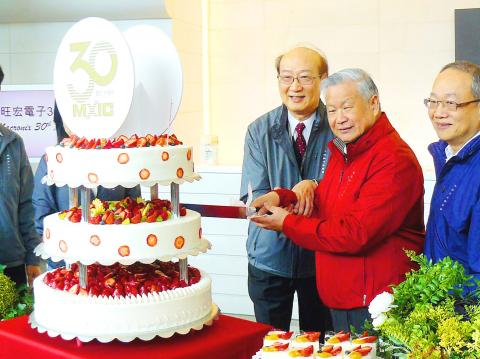Memorychip maker Macronix International Co (旺宏) yesterday said that it is shipping high-density memory chips for Huawei Technologies Co’s (華為) 5G base stations and expects client demand for the chips to peak next year or in 2021 in step with the global deployment of the next-generation wireless networks.
Other than Huawei, “80 percent of the [world’s] 5G companies are adopting our chips as well. Those [clients] are from China, Japan, Europe and South Korea,” Macronix chairman Miin Wu (吳敏求) told reporters at the company’s headquarters in Hsinchu.
“I believe the company is a major supplier to those [5G] clients,” he added.

Photo: CNA
As global telecom operators are just beginning to install base stations this year, shipments of Macronix’s memory chips used in 5G base stations are expected to peak next year, or the year after, Wu said.
He said that 5G base stations are expected to require a significant amount of memory chips, as they are usually equipped with high-density NOR flash with 1 or 2 gigabytes of memory.
Not only 5G technology, but also true wireless stereo earbuds are driving demand for memory chips and boosting memorychip prices, Wu said.
“Based on the information on hand, I think [prices] will grow mildly. The semiconductor looks quite good... There is room for price increases in the second half next year,” he said. “Demand for NOR flash and NAND flash memory chips should surpass supply sometime next year.”
Macronix expects demand to improve every quarter next year, he said.
Macronix, which turned 30 earlier this month, plans to ship its first 3D 48-layer NAND flash memory chips in the second half of next year, with the first batch going to Nintendo Co.
The chipmaker said that 3D 96-layer NAND flash memory chips would follow in 2021 and 192-layer chips in 2022.
To celebrate its 30th anniversary, Macronix is exhibiting innovative technologies and products — such as chips used in autonomous vehicles, automated external defibrillators, Fibit Inc’s smart watches, drones and Nintendo Co’s Switch game consoles — in a new showroom at its headquarters.
The company aims to grow its revenue from medical, industrial and automobile devices to make up 50 percent of the company’s revenue in the long term, compared with the current 25 percent, Wu said.
Macronix invests 15 percent of its annual revenue in research and development (R&D) and had 7,950 patents granted as of October, the company said, adding that about 20 percent of its 40,000 employees are R&D staff.
Macronix said that it would give a NT$10,000 (US$328) bonus to each employee to celebrate its anniversary.
In other words, it would pay a total of NT$40 million in bonuses, which Wu said reflected the company’s gratitude for the contribution made by its employees and support from their families.
The company reported earnings per share of NT$4.94 for last year and NT$1.21 per share for the first three quarters of this year.
Revenue for last month decreased 6 percent to NT$3.66 billion, from NT$3.89 billion a year earlier. In the first 11 months, cumulative revenue totaled NT$29.08 billion, 9 percent less than the NT$31.87 billion reported for the same period last year.
Additional reporting by CNA

PATENTS: MediaTek Inc said it would not comment on ongoing legal cases, but does not expect the legal action by Huawei to affect its business operations Smartphone integrated chips designer MediaTek Inc (聯發科) on Friday said that a lawsuit filed by Chinese smartphone brand Huawei Technologies Co (華為) over alleged patent infringements would have little impact on its operations. In an announcement posted on the Taiwan Stock Exchange, MediaTek said that it would not comment on an ongoing legal case. However, the company said that Huawei’s legal action would have little impact on its operations. MediaTek’s statement came after China-based PRIP Research said on Thursday that Huawei filed a lawsuit with a Chinese district court claiming that MediaTek infringed on its patents. The infringement mentioned in the lawsuit likely involved

Taipei is today suspending work, classes and its US$2.4 trillion stock market as Typhoon Gaemi approaches Taiwan with strong winds and heavy rain. The nation is not conducting securities, currency or fixed income trading, statements from its stock and currency exchanges said. Authorities had yesterday issued a warning that the storm could affect people on land and canceled some ship crossings and domestic flights. Taiwan Semiconductor Manufacturing Co (TSMC, 台積電) expects its local chipmaking fabs to maintain normal production, the company said in an e-mailed statement. The main chipmaker for Apple Inc and Nvidia Corp said it has activated routine typhoon alert

GROWTH: TSMC increased its projected revenue growth for this year to more than 25 percent, citing stronger-than-expected demand for AI devices and smartphones The Taiwan Institute of Economic Research (TIER, 台灣經濟研究院) yesterday raised its forecast for Taiwan’s GDP growth this year from 3.29 percent to 3.85 percent, as exports and private investment recovered faster than it predicted three months ago. The Taipei-based think tank also expects that Taiwan would see a 8.19 percent increase in exports this year, better than the 7.55 percent it projected in April, as US technology giants spent more money on artificial intelligence (AI) infrastructure and development. “There will be more AI servers going forward, but it remains to be seen if the momentum would extend to personal computers, smartphones and

Catastrophic computer outages caused by a software update from one company have once again exposed the dangers of global technological dependence on a handful of players, experts said on Friday. A flawed update sent out by the little-known security firm CrowdStrike Holdings Inc brought airlines, TV stations and myriad other aspects of daily life to a standstill. The outages affected companies or individuals that use CrowdStrike on the Microsoft Inc’s Windows platform. When they applied the update, the incompatible software crashed computers into a frozen state known as the “blue screen of death.” “Today CrowdStrike has become a household name, but not in